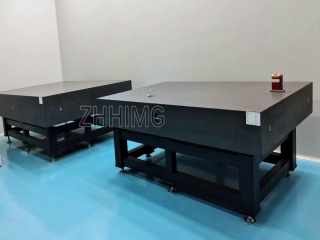In the field of precision measuring equipment, the accuracy and stability of the equipment are directly related to the accuracy of the measurement results, and the choice of materials to carry and support the measuring instrument is crucial. Granite and marble, as two common high-quality stone materials, are often considered for the construction of precision measuring equipment, but which one is better? Let's dig deeper.
Stability comparison
Stability is the cornerstone of precision measuring equipment. Granite is formed deep in the Earth's crust, after high temperature and high pressure for a long time quenching, the internal structure is dense and uniform. Millions of years of natural aging makes its internal stress has been fully released, which gives granite extremely high dimensional stability. When environmental factors such as temperature and humidity change, granite deformation is very small.
In contrast, marble, although it is also formed after a long-term geological process, but its crystalline structure is relatively coarse, and the composition contains more minerals such as calcium carbonate. These characteristics cause marble to expand or contract more easily in the face of environmental changes. For example, in an environment with large temperature fluctuations, the size change of marble may interfere with the measurement accuracy of precision measuring equipment, while granite can better maintain stability and provide a reliable foundation for measuring instruments.
Hardness and wear resistance
Precision measuring equipment in the long-term use of the process, it will inevitably suffer from a variety of friction and collision. Granite is hard in texture, and its Mohs hardness is usually about 6-7, which can effectively resist external wear and scraping. In the process of frequent placement and movement of measuring tools and samples, the granite surface is not easy to leave obvious marks, so as to maintain its flatness and accuracy for a long time.
The hardness of marble is relatively low, and the Mohs hardness is generally 3-5. This means that under the same conditions of use, the marble surface is more prone to scratches and wear, and once the surface smoothness is damaged, it will have a negative impact on the accuracy of precision measuring equipment. For measuring equipment requiring long-term, high-precision operation, the high hardness and wear resistance of granite is undoubtedly a more ideal choice.
Corrosion resistance analysis
Various chemicals may be present in the measurement environment, such as volatilization of acid-base reagents, which poses a challenge to the corrosion resistance of equipment materials. Granite is mainly composed of quartz, feldspar and other minerals, chemical properties are stable, with excellent acid resistance, alkali resistance. In complex chemical environments, granite can maintain its own physical and chemical properties for a long time to ensure the stable operation of precision measuring equipment.
Due to the chemical activity of its main component calcium carbonate, marble is prone to chemical reactions when encountering acidic substances, resulting in corrosion and damage to the surface. This corrosion will not only affect the appearance of the marble, but also destroy its structural stability, and then affect the precision of precision measuring equipment. Therefore, in the measurement environment where there is a risk of chemical corrosion, the corrosion resistance of granite makes it a more reliable material.
Comprehensive stability, hardness and wear resistance and corrosion resistance and other factors, granite in various key indicators have shown better than marble performance. For precision measuring equipment requiring high accuracy and stability, granite is undoubtedly a more suitable choice. It can provide a stable and reliable basis for measuring instruments, ensure the accuracy and reliability of measurement results, and help the precision measurement work in scientific research, industrial production and other fields to carry out smoothly.
Post time: Mar-28-2025

